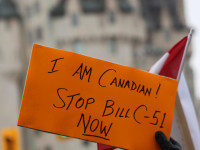Appeared in the Toronto Star on June 20, 2015 as More Canadian TV Channels May Be on the Chopping Block Rogers Media’s recent decision to slash 110 jobs and end all newscasts at OMNI, its multicultural channel, has sparked outrage among many ethnic communities, who have lamented the cancellation of […]
 Articles by: Michael Geist
Articles by: Michael Geist
Guess Who Claims Canadian Music May Go Silent Without Another Copyright Extension?
The government’s gift to the recording industry wrapped up yesterday as Bill C-59 received royal assent and with it, the term of copyright for sound recordings was extended from 50 to 70 years. I’ve chronicled in detail how the extension of the copyright term without public consultation or discussion hurts Canadian consumers, reduces competition, and is a direct result of record label lobbying (surprise, cost to consumers, limited competition, reduced access to Canadian heritage, lobbying impact).
As an added bonus, groups have started to use the extension to argue that the government should also extend the term of copyright for authors from the current term of life plus an additional 50 years to life plus 70 years. Randy Bachman has an op-ed in the Globe and Mail today calling for a copyright term extension that must be read to be believed. The piece was not only a day late (he calls for the government to extend term in the same budget bill that already received royal assent), but contains some of the most absurd claims about copyright in recent memory.
B.C. Court of Appeal Rules Facebook’s Fine Print Trumps Privacy Law
One week after the B.C. Court of Appeal ruled that it could order Google to remove websites from its global index, the same court (but different judges) ruled that a privacy class action lawsuit against Facebook could not proceed in the province because the Facebook terms and conditions provide that all disputes must be resolved in a court in Santa Clara, California. The decision should provide a wake-up call to users and policy makers because an absolute approach to terms and conditions not only means that Canadian courts may be unable resolve consumer disputes involving companies like Facebook, but that Canadian law will not apply either.
The current Facebook terms and conditions state:
You will resolve any claim, cause of action or dispute (claim) you have with us arising out of or relating to this Statement or Facebook exclusively in the U.S. District Court for the Northern District of California or a state court located in San Mateo County, and you agree to submit to the personal jurisdiction of such courts for the purpose of litigating all such claims. The laws of the State of California will govern this Statement, as well as any claim that might arise between you and us, without regard to conflict of law provisions.
While this appears to be slightly different from the terms that governed the dispute before the B.C. courts (it referenced courts in Santa Clara county), the key takeaway from the decision goes well beyond a proposed class action lawsuit over a Facebook “sponsored stories” program that no longer exists. The trial judge rightly noted that the heart of the case is whether online terms and conditions override domestic legal protections (in this case, the B.C. Privacy Act).
Why the Liberal Party Defence of Its Support for Bill C-51 Falls Flat
Bill C-51, the anti-terrorism bill, became law yesterday as it received royal assent. As polls continue to suggest that the Liberal support for the bill is shifting potential voters to the NDP, Liberal leader Justin Trudeau has conducted several interviews defending his position as the “right move for Canadians.” Trudeau’s arguments, which have been echoed by other Liberal MPs such as Marc Garneau, boils down to three key claims: he doesn’t want to play politics with security, there are elements in Bill C-51 he likes including greater information sharing, and he will fix the problems with the bill if elected.
For those Canadians looking for an alternative to the Conservative position on Bill C-51, Trudeau’s defence falls flat.
SOCAN Reports Canadian Internet Music Streaming Copyright Revenues Soar 525%
SOCAN, Canada’s largest music copyright collective, released its annual report this week, reporting record revenues and a massive increase in earnings from Internet streaming services. SOCAN reports that copyright revenues from Internet streaming hit $21.3 million, a 525% increase over the $3.4 million generated in 2013. The huge increase in Internet streaming revenues in Canada points to why persistent criticism about Tariff 8, a Copyright Board tariff for Internet streaming misses the mark. As I pointed out last year, Tariff 8 is only part of a larger ecosystem of royalties paid for Internet music streaming.
Indeed, the fact that songwriters, composers, and music publishers are successfully generating new revenues from Internet music services has actually been a target of criticism by the Canadian Recording Industry Association, which has intervened in tariff proceedings involving SOCAN to argue that its tariff proposals are “grossly excessive.”










